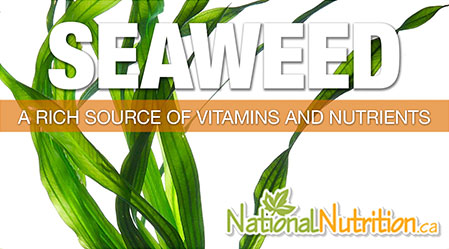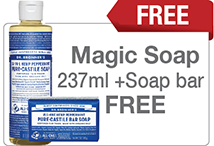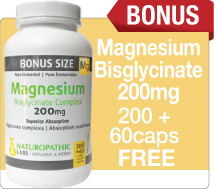
Seaweeds are a rich source of vitamins and nutrients.
Seaweed
Updated Mar. 07th, 2022
Edible seaweeds are marine (salt water) multicellular algae either of the red, green or brown subtypes, that grow as underwater plants. The freshwater varieties of seaweed are often toxic and are not covered by this article. Many different types of seaweed have been included as dietary supplements all around the world for centuries as a food source to help increase nutrient intake. Because of this, seaweeds are often called "sea vegetables".
Nutritional Content
Seaweed contains a large number of minerals including: sodium, calcium, magnesium, potassium, sulfur, phosphorus, zinc, iron, iodine, copper, selenium, molybdenum, fluoride, manganese, boron, nickel and cobalt. Seaweed is one of the richest plant sources of calcium and iron. Depending on the species of seaweed, it can also be a fantastic source of vitamins such as: vitamin A, C, K, and B vitamins, including vitamin B12. Many are also an excellent source of soluble fibre, depending on the species. For more information on the benefits of fibre, please click here. Some types of seaweed are rich in protein, particularly nori, wakame and dulce. For more information on the benefits of protein, please click here. This can provide an alternate protein source for vegetarians who can sometimes have difficulty getting enough in their diet. In general, seaweed is an excellent way to boost the nutritional content of your diet.
Iodine Content
Because of depletion of iodine in the soil, it has become extremely difficult to get sufficient amounts from diet alone. In order to counter this problem, staple foods like table salt are enriched with iodine to help cover the gap. In the case of iodized salt, the inorganic form of iodine is added. Seaweed is often highlighted for its ability to provide a rich organic source of iodine. Natural sources of iodine, such as those derived from seaweeds, are much more absorbable and easier for the thyroid gland to use than the inorganic (mined) sources found in enriched foods. In fact, one gram (a very small amount) of red and green algae can provide between 100 and 300 micrograms of iodine. This can cover the daily requirement of most adults. One gram of brown algae can provide 500 – 8,000 micrograms of iodine, which well exceeds the daily requirements of most adults. Interestingly, with prolonged large intake of iodine, the body will adapt and will regulate accordingly. Sudden changes in iodine intake can impact the thyroid, as this element is the main building block of thyroid hormone. It may be beneficial to ease your way into these sorts of dietary changes. For more information on the role of iodine in thyroid health, please click here.
Hypothyroidism
Some cases of hypothyroidism can be attributed to lack of iodine, and this causes a swollen thyroid (goiter). When there is insufficient iodine available to the thyroid gland, it is not able to produce sufficient thyroid hormone. Thus, it cannot properly regulate the body's metabolism, a condition known as hypothyroidism. Hypothyroid individuals experience many symptoms due to a lack of thyroid hormone including: fatigue, weight gain, hair loss, constipation, and frequent colds and flus. For more information on hypothyroidism, please click here.
Iodine Content and Radioactive Iodine
Seaweeds are rich in iodine, and thus have the potential to protect the thyroid from taking up radioactive iodine in the case of nuclear disaster, as seen in Japan in March of 2011. Radioactive iodine is strongly associated with the development of thyroid cancer, especially in infant and children populations. The iodine found in seaweed binds to receptors on the thyroid gland, essentially filling the receptors, making it impossible for radioactive iodine to bind and be utilized by the gland in the making of thyroid hormone. This can provide a short-term protection against a sudden threat. Excess iodine can cause thyroid dysfunction, so it is not advised long-term, especially in children. Individuals with a hyperthyroid condition are not advised to take seaweed or iodine. For more information on iodine, please click here.
TYPES OF SEAWEED and SEAWEED EXTRACTS
Agar
This is an extract from red algae that is often used as a thickening agent for jellies and as a culture medium to grow bacteria and fungi in a laboratory. It can be used in cooking as a vegetarian substitute for gelatin. For more information on agar, please click here.
Alaria
A certain subtype of brown algae that is closely related to wakame contains a number of different vitamins and nutrients. It also contains approximately 45% fibre by weight and also contains large amounts of bioavailable iron. For more information on alaria, please click here.
Bladderwrack
In addition to being a rich source of vitamins and nutrients such as iodine, bladderwrack also has the ability to help soothe acid reflux. There is also some research indicating that bladderwrack may help to balance the female menstrual cycle. For more information on bladderwrack, please click here.
Dulse
This red algae contains all of the trace elements required by humans. It also has the highest levels of B vitamins and iron of any of the edible seaweeds. Dulse is also approximately one-third protein and one-third fibre by weight, making it a fantastic nutrient-rich addition to any diet. For more information on dulse, please click here.
Kelp
One of the more common seaweed supplements available on the market is kelp. It is an exceptionally rich dietary supplement containing vitamins and minerals including high levels of iodine. For more information on kelp, please click here.
Nori / Laver
Probably the most well-known seaweed on the market is nori. It is commonly found in the dried sheets used to wrap sushi. This seaweed is rich in many vitamins and minerals, including iodine for thyroid support. Nori is also an excellent source of bioavailable iron. For more information on nori, please click here.
Wakame
This brown algae is most commonly found in seaweed salad and Japanese miso soup. It is rich in vitamins and minerals, as well as iodine. Interestingly, wakame is the only edible seaweed that contains fucoidan, a molecule that has a number of added health benefits. Some preliminary research has found that fucoidan may help to kill cancer cells and prevent or treat allergic eczema. For more information on wakame, please click here.
How can I get more seaweed?
Depending on which type interests you, seaweed can be found in a number of different forms. Most types are available raw or dried, and can easily be added to any diet in soups, salads, as a wrap for sushi or even simply eaten plain. Most types can be found powdered and/or encapsulated for easy supplementation. Some powdered seaweeds are used as an alternative to table salt for seasoning foods. A number of iodine supplements are made from seaweed sources. The standardized types of these supplements contain a higher level of iodine and a consistent amount in each tablet – usually about 150mcg (0.15mg). This is the preferred form for clinical use in low thyroid conditions, while the un-standardized seaweed supplements are more suitable for people in need of a daily supplement for health maintenance. Often this is more easily achieved by simply incorporating seaweed into your diet as explained above.






















Who knew that there are so many types of seaweed! I thought it was interesting that agar is used to substitute gelatin, fascinating! Bladderwrack was also a fascinating type, helping to balance the menstrual cycle and sooth acid reflux! Dulse seems to be extremely healthy and beneficial. It is also good to know that the seaweed used to make sushi is beneficial too! And don't sleep on wakame which seems to be a powerhouse by it's ability to kill cancer cells! Incredible. Seaweed is amazing!
Hello Rose With Thorns,
This is great to hear! We're glad you thoroughly enjoyed this article. Seaweed is pretty fascinating and has a myriad of benefits. It also has many skin benefits. If you'd like to learn more about skin health, check out this article too: https://www.nationalnutrition.ca/articles/health-concerns/skin-health/